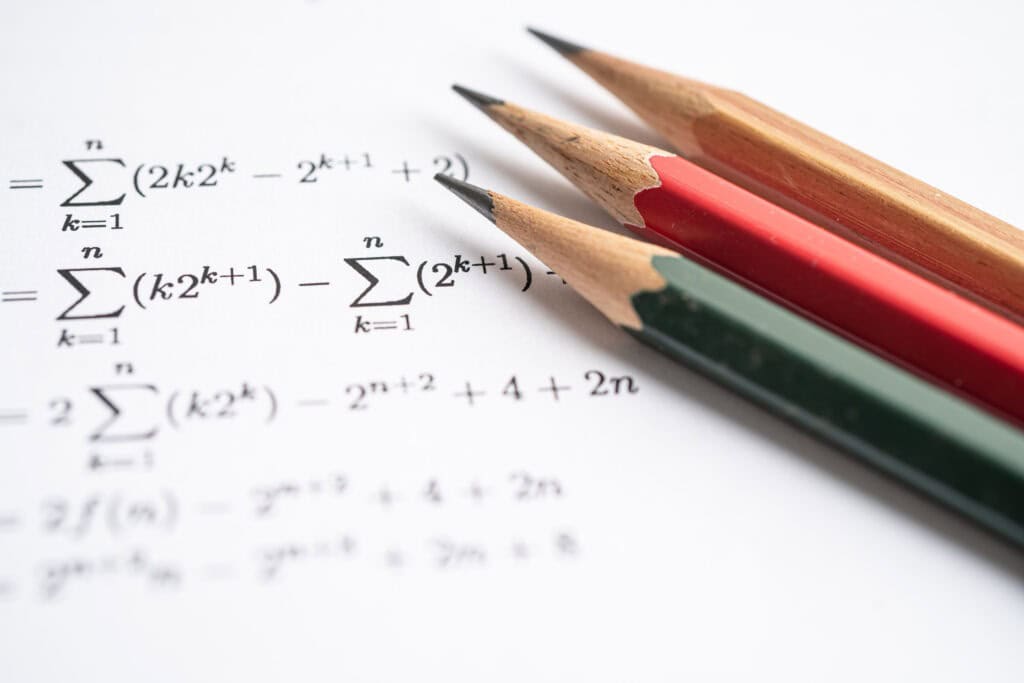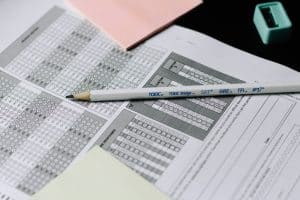Everyone says that past exam questions are the key to success in VCE Maths Methods — but where can you actually find them?
As it turns out, right here!
Here, you’ll find a collection of past VCAA exams, including the NHT VCAA exams! Furthermore, we’ll also give you the right pointers to help you out as you dive into these past exams.
How does the VCE Maths Methods Exam work?
Is VCE Methods Hard?
Key Changes from the Current Study Design
How do you make the best use out of these past VCE Maths Methods Exams?
General Tips
Excelling in Exam 1 and Exam 2
VCE Maths Methods Past Exams
How does the VCE Maths Methods Exam work?
You will have two end of year exams.
For the first exam, you will have no notes and no calculator. For your second exam, you are allowed to use a CAS calculator and a summary book.
Don’t be fooled though! Most students find that the second exam is much harder!
Do you know which VCE Maths subject you should study?
Summary book? What’s that?
Your summary book is a book of notes that you can bring into certain SACs and exams — make sure you know when you’re allowed to bring it in!
As you progress through the year, you should think about how to make the best use of your summary book.
This usually involves putting in relevant concepts, worked examples but also things like general exam tips and calculator strategies.
Tip: Remember your summary book needs to be useful during an exam. If it’s well organised and concise, this will make it easier for you to find what you need during the exam.
Is VCE Methods Hard?
Maths Methods is a tough subject — there’s a lot to learn, and the exams will throw curveballs that might throw you off.
In Maths Methods, the secret to success is practice. Do as many practice SACs and exams as you can, doing so will develop problem solving skills – the most important part of the whole subject!
Tip: Every time you are stuck with a question, take a step back and remind yourself that you can only be asked questions that are within the study design.
Key Changes from the Current Study Design
- AOS 1: f∘g notation is now a requirement. Matrix transformations have been removed.
- AOS 3: Newton’s method has been implemented to functions in Unit 3 and Unit 4. Approximation of area under a curve is now done using trapeziums, not rectangles.
- AOS 4: You no longer need to the median for continuous random variables.
- Computational and algorithmic skills have been added.
Please note that these changes have been identified within VCAA’s new Maths Methods VCE Study Design (2023-2027).
Additionally, keep note of the ‘amendments’ section in the study design in case of any new changes being made.
How do I make the best use out of these past VCE Maths Methods Exams?
This will depend on where you are at in the year!
If it is still early in the year, focus on completing specific questions that are relevant to the topic you are working on. Every mark is worth 1.5 minutes — so consider trying to complete a 3 mark question in 4.5 minutes for example!
If you’ve finished all (or most) of the course, then you might be ready to try some full exams! Start off easy — don’t attempt to finish everything under timed conditions straight away.
Tip: Try to mimic the exam setting as best you can. Not just attempting these questions under timed conditions, but also in a quiet room and even at the same time as your exam!
I think I’m ready for the real, authentic exam experience. What are some general tips?
Make sure you go in with a plan — including for reading time!
Will you start by looking at the last (and usually hardest) question in the exam? Or will you formulate a plan for the first questions? Maybe you’ll decide on which questions to skip?
In any case, make sure you’ve got a good game plan going into the exam.
Note: You are not allowed to use a calculator during reading time, but you can refer to your summary book. Make sure you know what you can and can’t do during reading time!
Make sure you learn the difference between similar concepts. Don’t get your average and instantaneous rates of change mixed up, and don’t think that the variance is the same as the standard deviation (they are similar though…)
Tip: Think about what key words you would look for to work out which specific concept would apply to a question.
How to Excel in…
Exam 1
Even though you don’t have notes, you will be given a formula sheet. It’s not much, but you could use the formulas as a cue to help you remember more complicated concepts.
Without a calculator to double-check your answers, it can become very easy to make an arithmetic error. Try to think of your own ways to double-check your answers — maybe differentiate your antiderivatives, or substitute in the x-value for your x-intercept!
You’ll also notice some trends. For example, Question 1 will be related to differentiation, and you’ll very likely get a trigonometric equation.
Also taking VCE Physics? Make sure to brush up your knowledge on using the VCE Physics Formula Sheet and read our definitive guide!
In general, most questions in Exam 1 will be fairly similar to your textbook questions, so get comfy with your textbook!
Exam 2
For Exam 2, you will have multiple choice and extended response questions.
To maximise your chances of doing well for multiple choice, you should try to learn as many calculator shortcuts as you can. The only thing that matters is that your final answer is correct!
Extended response questions are broken down into smaller sub-questions. Most sub-questions will be worth either 1 or 2 marks.
Again, make frequent use of your calculator! If in doubt, set up the equation, but solve the equation on your calculator (and write the answer).
Note: The exception to this rule is if you are asked to “show that…” in which case, a full explanation will likely be needed!
The later questions in Exam 2 are always extremely challenging. You will see that only 2-3% of the entire cohort receives full marks for the last few sub-questions. Often, this question will use either composite or addition/subtraction functions, and later use a pronumeral.
Tip: We hear that the dynamic graph feature could be useful here!
Note: The NHT examination reports are not as detailed as the regular examination reports. Make sure to ask for help if you don’t understand the correct answer!
VCE Maths Methods Past Exams
Current study design (2023-2027)
| Year | VCE Examination Paper | Examination Report |
|---|---|---|
| 2023 (Sample Paper) | VCE Maths Methods - Written exam 1 VCE Maths Methods - Written exam 2 | No Examination Report Provided |
Past study designs
Most questions are still relevant. However, VCAA has removed some concepts including (but not limited to):
- The rectangular rule for approximation of definite integral
- Matrix representations (e.g. 2021 Written examination 1, Question 9b)
- Modulus function (e.g. 2015 Written examination 2, multiple choice, Question 18)
- Related rates (e.g. 2014 Written examination 2, extended response, Question 2f)
- Linear approximations (e.g. 2009 Written examination 1, Question 10a)
You can also check out our 25 Maths Methods practice questions!
On the hunt for other VCE past exams?
We’ve got you covered! Check out the lists we’ve made for the subjects below:
Check out more of our Maths Methods resources here:
- The Ultimate 7 Day Study Plan for Your VCE Maths Methods Exam
- VCE Maths Methods External Assessment Practice Questions
- What to Do the Night Before Your VCE Maths Methods Exam
- The Ultimate Guide to VCE Maths Methods Unit 1 and 2 Practice SACs
- Everything You Need to Know from the VCE Maths Methods Study Design
Preparing for your Chemistry exam too? Here’s all you need to know about using the VCE Chemistry data book effectively.
Are you looking for some extra help with preparing for your VCE Maths Methods Exam?
We have an incredible team of VCE tutors and mentors!
We can help you master the VCE Maths Methods study design and ace your upcoming VCE assessments with personalised lessons conducted one-on-one in your home or online!
Get booked in today with one of our Melbourne VCE Maths tutors! Or looking for VCE support in Box Hill? Call us today!
We’ve supported over 8,000 students over the last 11 years, and on average our students score mark improvements of over 20%!
To find out more and get started with an inspirational VCE tutor and mentor, get in touch today or give us a ring on 1300 267 888!
Kevin Chen recently completed his Bachelor of Biomedicine at the University of Melbourne. He is now undertaking an Honours year, where he is investigating the rise of hospital superbugs. Kevin lives by the motto “smiles go for miles!”




